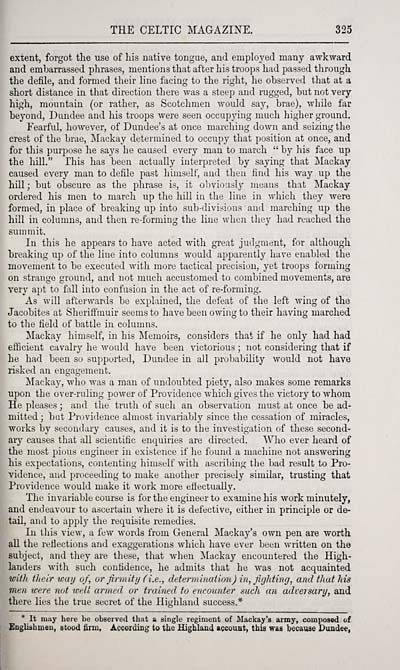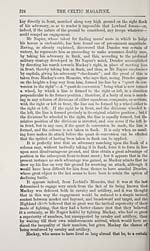Blair Collection > Celtic magazine > Volume 2
(335)
Download files
Complete book:
Individual page:
Thumbnail gallery: Grid view | List view

THE CELTIC MAGAZINE. 325
extent, forgot the use of liis native tongue, and employed many awkward
and embarrassed phrases, mentions that after his troops had passed through
the defile, and formed their line facing to the right, he observed that at a
short distance in that direction there was a steep and rugged, but not very-
high, mountain (or rather, as Scotchmen would say, brae), while far
beyond, Dundee and his troops were seen occupying much higher ground.
Fearful, hoAvever, of Dundee's at once marching down and seizing the
crest of the brae, Mackay determined to occupy that position at once, and
for this purpose he says he caused every man to march " by his face up
the hill." This has been actually interpreted by saying that Jtlackay
caused every man to defile past himself, and then find his way up the
hill; but obscure as the phrase is, it obviously means that Mackay
ordered his men to march up the hill in the line in which they were
formed, in place of breaking up into sub-divisions and marching up the
hill in columns, and then re-forming the line when they had reached the
summit.
In this he appears to have acted with great judgment, for although
breaking up of the line into columns would apparently have enabled the
movement to be executed with more tactical precision, yet troops forming
on strange ground, and not much accustomed to combined movements, are
very apt to fall into confusion in the act of re-forming.
As will afterwards be explained, the defeat of the left wing of the
Jacobites at Sheriffmuir seems to have been owing to their having marched
to the field of battle in columns.
Mackay himself, in his Memoirs, considers that if he only had had
efficient cavalry he would have been victorious ; not considering that if
he had been so supported, Dundee in all probability would not have
risked an engagement.
Mackay, who was a man of undoubted piety, also makes some remarks
upon the over-ruling power of Providence Avhich gives the victory to whom
He pleases ; and the truth of such an observation must at once be ad-
mitted ; bat Providence almost invariably since the cessation of miracles,
works by secondary causes, and it is to the investigation of these second-
ary causes that all scientific enquiries are directed. AVho ever heard of
the most pious engineer in existence if he found a machine not answering
his expectations, contenting himself with ascribing the bad result to Pro-
vidence, and proceeding to make another precisely similar, trusting that
Providence would make it work more effectually.
The invariable course is for the engineer to examine his work minutely,
and endeavour to ascertain where it is defective, either in principle or de-
tail, and to apply the requisite remedies.
In this view, a few words from General Mackay's own pen are worth
aU the reflections and exaggerations which have ever been written on the
subject, and they are these, that when ^Mackay encountered the High-
landers with such confidence, he admits that he was not acquainted
with their way of, or firmity (i.e., determination) in, Jigliting, and that his
men were not tveil armed or trained to encounter such an adversary, and
there lies the true secret of the Highland success.*
* It may here be observed that a single regiment of Mackay's army, composed of
Englishmeu, stood firm. According to tbe Highland account, this was because Dundee,
extent, forgot the use of liis native tongue, and employed many awkward
and embarrassed phrases, mentions that after his troops had passed through
the defile, and formed their line facing to the right, he observed that at a
short distance in that direction there was a steep and rugged, but not very-
high, mountain (or rather, as Scotchmen would say, brae), while far
beyond, Dundee and his troops were seen occupying much higher ground.
Fearful, hoAvever, of Dundee's at once marching down and seizing the
crest of the brae, Mackay determined to occupy that position at once, and
for this purpose he says he caused every man to march " by his face up
the hill." This has been actually interpreted by saying that Jtlackay
caused every man to defile past himself, and then find his way up the
hill; but obscure as the phrase is, it obviously means that Mackay
ordered his men to march up the hill in the line in which they were
formed, in place of breaking up into sub-divisions and marching up the
hill in columns, and then re-forming the line when they had reached the
summit.
In this he appears to have acted with great judgment, for although
breaking up of the line into columns would apparently have enabled the
movement to be executed with more tactical precision, yet troops forming
on strange ground, and not much accustomed to combined movements, are
very apt to fall into confusion in the act of re-forming.
As will afterwards be explained, the defeat of the left wing of the
Jacobites at Sheriffmuir seems to have been owing to their having marched
to the field of battle in columns.
Mackay himself, in his Memoirs, considers that if he only had had
efficient cavalry he would have been victorious ; not considering that if
he had been so supported, Dundee in all probability would not have
risked an engagement.
Mackay, who was a man of undoubted piety, also makes some remarks
upon the over-ruling power of Providence Avhich gives the victory to whom
He pleases ; and the truth of such an observation must at once be ad-
mitted ; bat Providence almost invariably since the cessation of miracles,
works by secondary causes, and it is to the investigation of these second-
ary causes that all scientific enquiries are directed. AVho ever heard of
the most pious engineer in existence if he found a machine not answering
his expectations, contenting himself with ascribing the bad result to Pro-
vidence, and proceeding to make another precisely similar, trusting that
Providence would make it work more effectually.
The invariable course is for the engineer to examine his work minutely,
and endeavour to ascertain where it is defective, either in principle or de-
tail, and to apply the requisite remedies.
In this view, a few words from General Mackay's own pen are worth
aU the reflections and exaggerations which have ever been written on the
subject, and they are these, that when ^Mackay encountered the High-
landers with such confidence, he admits that he was not acquainted
with their way of, or firmity (i.e., determination) in, Jigliting, and that his
men were not tveil armed or trained to encounter such an adversary, and
there lies the true secret of the Highland success.*
* It may here be observed that a single regiment of Mackay's army, composed of
Englishmeu, stood firm. According to tbe Highland account, this was because Dundee,
Set display mode to: Large image | Transcription
Images and transcriptions on this page, including medium image downloads, may be used under the Creative Commons Attribution 4.0 International Licence unless otherwise stated. ![]()
| Early Gaelic Book Collections > Blair Collection > Celtic magazine > Volume 2 > (335) |
|---|
| Permanent URL | https://digital.nls.uk/78484174 |
|---|
| Description | Volume II, 1877. |
|---|---|
| Shelfmark | Blair.3 |
| Attribution and copyright: |
|
| Description | A selection of books from a collection of more than 500 titles, mostly on religious and literary topics. Also includes some material dealing with other Celtic languages and societies. Collection created towards the end of the 19th century by Lady Evelyn Stewart Murray. |
|---|
| Description | Selected items from five 'Special and Named Printed Collections'. Includes books in Gaelic and other Celtic languages, works about the Gaels, their languages, literature, culture and history. |
|---|

